In This Section
- English
- About the Department
- People
- Study
- Research
- News
- Media Gallery
- Edmund Spenser in Cork - School of English UCC
- Mary Breen: Pride and Prejudice
- MA in Irish Writing and Film
- Ann Coughlan: The Irish Influence on America's Greatest Abolitionist
- MA in Modernities: Romanticism, Modernism, Postmodernism
- MA in American Literature and Film
- MA in English Texts and Contexts: Medieval to Renaissance
- PhD in English
- Prof. Claire Connolly
- Tonio Colona - PhD in the School of English, UCC
- Prof Patricia Coughlan
- Mike Waldron - PhD in the School of English
- Ken Rooney and Heather Laird Book Launch
- School Welcome Event September 2014
- Contemporary American Trauma Narratives Book Launch
- Staged Transgressions in Shakespeare's England
- Seamus Heaney Memorial Event September 2013
- Creative Writing
- Current Students
- Student Achievements
- Digital Humanities
- Creative Writing
Department of English MA Students’ annual Textualities Conference
(1)-403x569.jpg)
Students in the Modernities and the Texts and Contexts: Medieval-Renaissance MA programmes in the Department of English held their tenth annual student-designed and led conference on 6 April 2023. The conference, ‘Textualities23,’ shared some of their postgraduate research in short, lively Pecha Kucha presentations. The conference is part of the MA module EN6009: Contemporary Research: Skills, Methods, and Strategies. This module prepares students to engage with a range of research techniques, methodologies, and approaches to information resources, developing skills in formulating and communicating research ideas in the contemporary networked scholarly environment. This conference provides an opportunity to demonstrate these skills and more, from the design of conference materials, to the organisation of panels, to the promotion of the event across media platforms, including a blog, social media, and posters, to the use of technology and presentation delivery skills on the day itself.
Regularly held in the impressive North Council Room in the neo-gothic nineteenth-century UCC Quad, in this conference the MAs deliver accessible and engaging presentations on an element of the research they plan to pursue in more detail in their MA theses. Adaptation proves a reliably popular subject for considerations of English-language literature, and this year’s presentations on adaptation focused on the afterlife of texts in the form of film, television, video games, and novels. Topics included the 14th-century romance Sir Gawain and the Green Knight, Charlotte Brontë’s 1847 novel Jane Eyre, and Arthur Conan Doyle’s 1902 novel The Hound of the Baskervilles. Other topics included the figure of disability in Victorian fiction, dystopian fiction that reflect on the implications of the Anthropocene, medieval representations of ghosts, the gothic trope of the haunted house, and the philosophical significance of the grotesque in Edgar Allen Poe’s short story ‘The Fall of the House of Usher’, to mention only some of the fascinating discussions, all of which were followed by informed and spirited question-and-answer sessions.
Students organised the day and handled the technical requirements of not only in-person presentations, but one necessarily virtual presentation as well. Panel chairs handled introductions and post-presentation discussions with warm and professional aplomb and even humour. Anyone attending was greeted at the door and took with them a gorgeous programme to remember the day. The day’s events were recorded on the conference Twitter and Instagram accounts, under the #Textualities23 hashtag. The highly entertaining conference blog is worth a visit, even after the event: Textualities 2023 (hcommons.org). Attendance by members of staff is always excellent and much-appreciated. Presenters and audience were invigorated and happily exhausted at the end of an exciting and productive day!
Students lead and present research at the Inkwell: Medieval to Renaissance Symposium 2023
_(1)1024_1[1]-352x500.jpg)
_(1)1024_2[1]-352x500.jpg)
On Saturday March 24th 2023 UCC students (both past and present) delivered exceptional papers at Inkwell: Medieval to Renaissance Symposium, the first in-person gathering since the onset of the Covid-19 pandemic. Inaugurated in 2016 by MA and BAs in the Department of English, Inkwell is a student-led event established to nurture an interest in the Medieval and Renaissance periods. Students at undergraduate and postgraduate level take part as presenters, chairs, and organisers, developing professional skills and graduate attributes such as independent thinking, creativity, and effective communication. This year the symposium was organised by Robyn McAuliffe, a first-year PhD in the Department of English whose research focuses on gendered violence in Old English and Old Norse literature. As organiser, Robyn developed the symposium's theme and Call for Papers, promoted the event to students, managed funding, organised a keynote speaker, planned the event, liaised with participants and staff across the University, amongst other duties.
The theme for the 2023 Inkwell symposium was “Desire and Shame,” with students approaching this theme in very different ways, though there was a strong interest in the Renaissance and literature of the early modern period. With over a dozen papers and a wide range of topics, this was the largest Inkwell symposium ever held. Papers explored plays such as Ben Jonson’s comedy Epicoene, John Webster’s tragedy The Duchess of Malfi, and seventeenth century country house poetry, though Shakespeare was by far the most popular subject with a number of students examining his drama. The huge student interest in earlier literatures and the excellence of student research in this area is demonstrated by the diverse subjects examined in papers, which included: the construction of female desire and autonomy, gender performativity, desire in performance and Renaissance art, and the links between violence and shame (to name but a few). The papers were rounded off with a foray into the medieval period, with a final panel of papers where students explored prudishness in Old English biblical translations and spatial metaphors in Chaucerian literature.
Inkwell’s keynote address, delivered by guest speaker Dr Miranda Fay Thomas of Trinity College Dublin, brought the busy conference day to a close. Her paper, “Shameful Shakespeare: Gesture as Embodied Metaphor,” offered an engaging analysis of gestures in a number of Shakespeare’s seminal works and piqued the interest of the audience, sparking many conversations. The Inkwell organiser wishes to thank Dr Thomas, the student English Society, and the Department of English for their support. Finally well done and congratulations, once again, to the UCC students for their fantastic presentations and research contributions to medieval and Renaissance studies!
Third Year “Women in Renaissance Drama” seminar students produce original research presentations
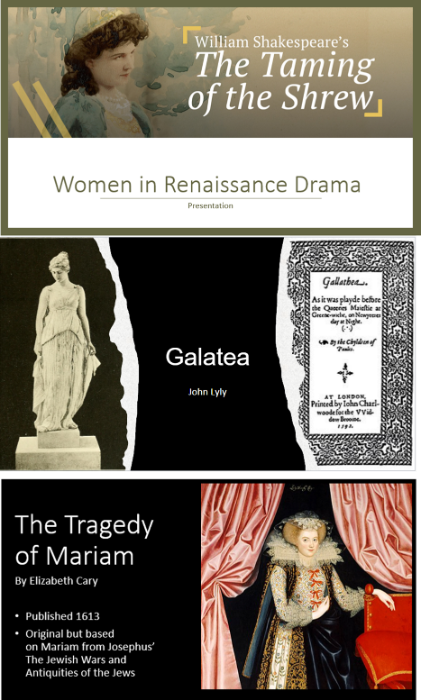
Third Year students in the Special Studies seminar “Women in Renaissance Drama”, led by Dr Edel Semple, have researched, designed, and delivered presentations on the portrayal of women in early modern plays and socio-historic texts.
Over the course of semester 1 2022-2023, the seminar students examined the depiction and understanding of women, their lives and deaths, as staged in Elizabethan and Jacobean tragedies and comedies, from William Shakespeare’s The Taming of the Shrew to Elizabeth Cary’s The Tragedy of Mariam. As part of their coursework, students independently selected a text – such as a medical, legal, religious, or educational work produced between c.1500-1699 – and demonstrated how it illuminated our understanding of female characters in drama. Students chose texts such as Nicholas Breton’s book of characters The Good and the Badde (1616) Katherine Philips’ poem “To My Excellent Lucasia, on Our Friendship”, and Dod and Cleaver’s household manual A Godly Form of Household Government (1598).
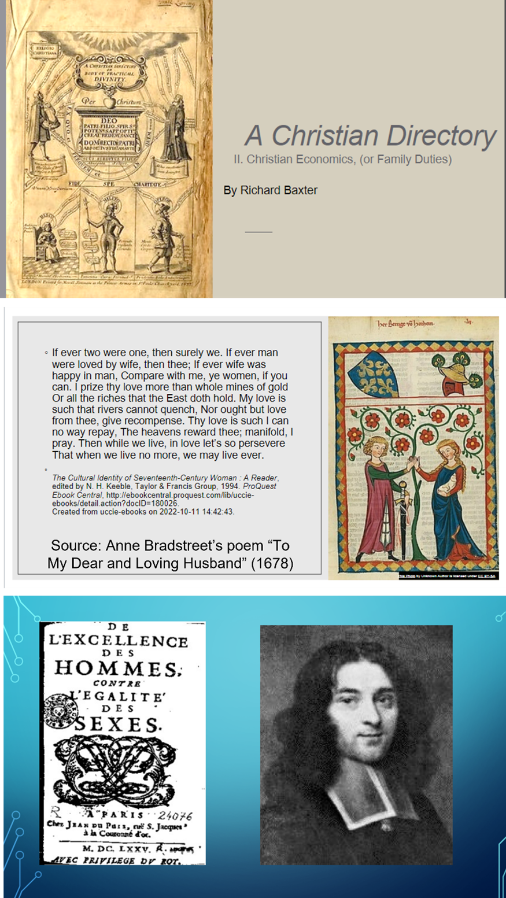
In the early modern period, as now, women occupied a multitude of roles, and were labelled and categorised according to sexuality, class, race, appearance, occupation, wealth, and religion. Dr Semple’s seminar focuses on plays where women take centre-stage as title characters and which pay particular attention to women’s positions as virgin, wife, daughter, sister, mother, transvestite, widow, rebel, superior, idol, lover, worker, whore, aggressor, and victim. With such a rich field of investigation, it is no wonder that the “Women in Renaissance Drama” class, which included BA Arts, BA English, and visiting students, analysed a wide range of subjects in their presentations. Using a single text, each student presentation identified issues relevant to a play and explored these in class discussion: these included marriage, virginity, motherhood, same-sex desire, gender-based violence, women in power, social inequalities, women’s education, the legacy of women writers, and female friendship and competition, to name just a few!
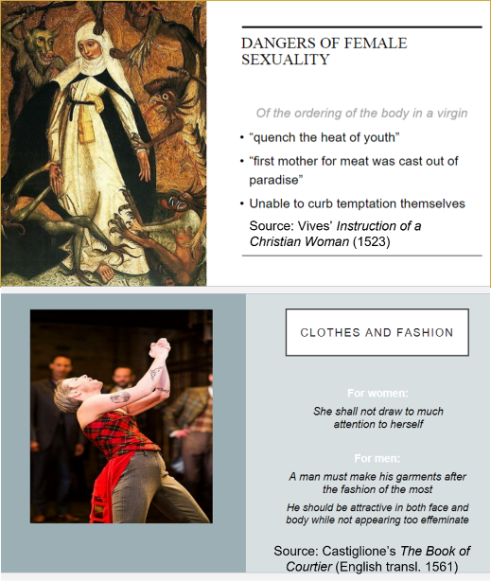
Well done to the “Women in Renaissance Drama” (WiRD!) students for their fantastic contributions to early modern literary studies!
PhD Student Edel Hanley Attends The Life and Work of W. M. Letts (1882 -1972) Symposium
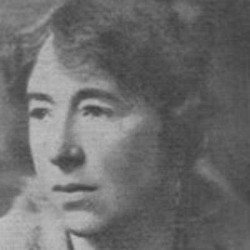
PhD student Edel Hanley recently presented at The Life and Work of W. M. Letts (1882 -1972) Symposium:
On Thursday 9th June 2022, I was fortunate to have been invited to participate in, and speak about, poet and playwright Winifred M. Letts as an overlooked writer of the First World War at County Library Tallaght. The Life and Work of W. M. Letts (1882 -1972) Symposium had been organised by South Dublin Libraries to explore Letts’ life and works as well as to mark the fiftieth anniversary of her death in 1972. I had first come by Letts work by complete coincidence in the Boole Library while studying for my BA in English and History at University College Cork and have continued to be haunted by the opening lines of her poem, “If Love of Mine,” since that fateful encounter:
If love of mine could witch you back to earth
It would be when the bat is on the wing,
The lawn dew-drenched, the first stars glimmering,
The moon a golden slip of seven nights’ birth.
As a result, when I began my PhD researching representations of war trauma in Women’s First World War poetry and autobiographical writing, again at University College Cork, I felt compelled not only to incorporate Irish women who dealt with the impact of war at the Home Front, but in particular, Letts, the poet whose enchanting words had stirred up my fascination with her unique experience as nurse and civilian at the Irish Home Front.
The symposium began with a very informative paper from Bairbre O’ Hogan, who grew up knowing Letts who had been a great friend of her late mother. Bairbre gave an insightful overview of Letts’ autobiographical landscape and family background, mapping the literary career of Letts as a widely published playwright, children’s author, and poet. Of particular interest to my research was Bairbre’s glimpse into Letts’ First World War experience as a Voluntary Aid Detachment nurse and later a masseuse, treating military personnel who had lost limbs at the battlefront. Letts had published two collections of poetry during the period 1914-18, including Hallowe’en and Poems of the War (1916) and The Spires of Oxford (1917). By this time, Letts was already a prolific writer among the Irish literary scene, having published nine novels, two plays, and a collection of poetry, The Songs of Leinster (1913). Hallowe’en and Poems of the War and The Spires of Oxford, however, were written in direct response to the global conflict of the First World War and the poems, unlike many of her contemporaries, dealt not with the glory of war but the brutality of the trenches.
Letts poetry predates that of combatants including Siegfried Sassoon and Wilfred Owen, whose works continue to define public perception of what the First World War was like, and yet, unlike these trench-poets, her poetry has long been sidelined in spite of her first-hand accounts of the horror of battle. Historically, women’s poetry of the First World War period has been perceived as less valuable than trench poetry in terms of rendering war, a notion first formed by the belief that women, as civilians, could not understand the soldierly experience of combat from the presumed safety of the Home Front. Therefore, women were seen, and often understood, to be incapable of understanding what the experiences of the trenches was like. In my paper, entitled “when the bugles sounded war”: W. M. Letts, Women, and the First World War, I made the case that poems such as “Screens (In a Hospital) challenge the representation of women as indifferent to war. In it, Letts as nurse describes the suffering of wounded soldiers:
They put the screens around his bed;
A crumpled heap I saw him lie,
White counterpane and rough dark head,
Those screens—they showed that he would die.
Poet Jane Clarke’s discussion of Letts’ early nature poetry was of equal interest as the day went on. Jane spoke about the unique ‘moderness’ of Letts’ nature poems, which focus on the beauty of the natural world, making the case that the poet often uses quite contemporary and colloquial Irish terms such as geansaí. Certainly, and upon reflection, some of the war poems I went on to discuss could equally have been written today. For example, Letts' “Dead,” discussed by both myself and Jane, contemplates the difficulty of accepting the loss of a loved one in a particularly modern voice. The poem begins with the poet’s disbelief that her “beloved” may be dead:
In misty cerements they wrapped the word
My heart had feared so long: dead... dead... I heard
But marvelled they could think the thing was true
Because death cannot be for such as you.
Letts here does not deny readers a glimpse into the feelings attached to losing a loved one at the front lines during the First World War. However, the poet does so in a way that shields us from confronting the gorier side of war. She focuses on Home Front mourning and privileges the pain of women over the suffering of male combatants, a notion that is particularly evident in the closing lines of the poem when we are told that “The tennis court is marked, the wrens are fled, / But you are dead, beloved, you are dead.”
In her paper, “Gorse turned gold: W.M. Letts and the poetry of nature,” Jane artfully put her own poems in dialogue with that of Letts to further demonstrate that much of Letts’ works could have been written by a twenty-first century poet. Jane’s meditative poem, “22nd June,” written for her husband, and set the day before his birthday, bears marked comparison to much of the poetry Letts wrote for her husband, W. H. F. Verschoyle. Letts married Verschoyle, who was twenty-three years her elder, in 1926, and the couple lived in Fitzwilliam Square in Dublin until his death in 1943. Letts’ poem, “Your Name,” however, was not written for Verschoyle; rather it imaginatively describes the loss of a loved one far away at the battlefronts during the First World War and so relates to much of the civilian poems mourning the deaths of loved ones in my thesis. In “Your Name,” the speaker suggests that she does not associate death with her beloved who still remains “a participant in every thought of [hers].” While the combatant figure is remembered and adored even in death, the speaker eventually comes to the conclusion that her time cherishing his memory will not last because she has “won a saint but lost a lover.” Jane’s poem likewise deals with the constraints of time on the love between herself and her husband, albeit in a way that expels any sense of distance between the couple:
Because it’s bright till almost midnight
and the days will be short too soon,
let’s stay outside and listen
for the wood pigeon’s five-note tune.”
Unlike Letts, Jane’s poem looks forward to the time that still remains with her husband. It draws the reader into the present and blissfully forgets what is yet to come. Letts’ speaker, on the otherhand, vows to painfully dwell in the past rather than move forward so that her lover’s name “shall still be linked with laughter and with joy.”
Overall, the symposium enhanced my understanding and passion for Letts’ poetry, poetry that nourishes the soul in its delicate portrayal of love, nature, and war. Unfortunately, I was unable to stay and listen to Shirley-Anne Godfrey’s paper, which focused on Letts’ career as a woman playwright, though I have no doubt it would have equally enriched my love for Letts’ works. The organisation and taking place of The Life and Work of W. M. Letts (1882 -1972) Symposium was a touchstone to the renewed critical interest in Letts’ literary career, at which I was privileged to meet Letts’ great niece, Orianna O’ Connor, and in writing this reflection, I am not only excited to get better acquainted with the Letts works I have yet to discover but also to help fulfill Orianna’s dream of sharing her great-aunt’s life and career with an audience that is hungry for modern, thoughtful, and sensitive poetry like that of W. M. Letts.
BA English Students Contribute to Award-Winning Rosie Amber Blog
As part of the first year BA programme, students in the department of English had the opportunity to review short story collections for the award-winning US blog Rosie Amber. With help from their tutor Dr Jenni deBie, the students reviewed newly published collections and had their reviews published on the site.
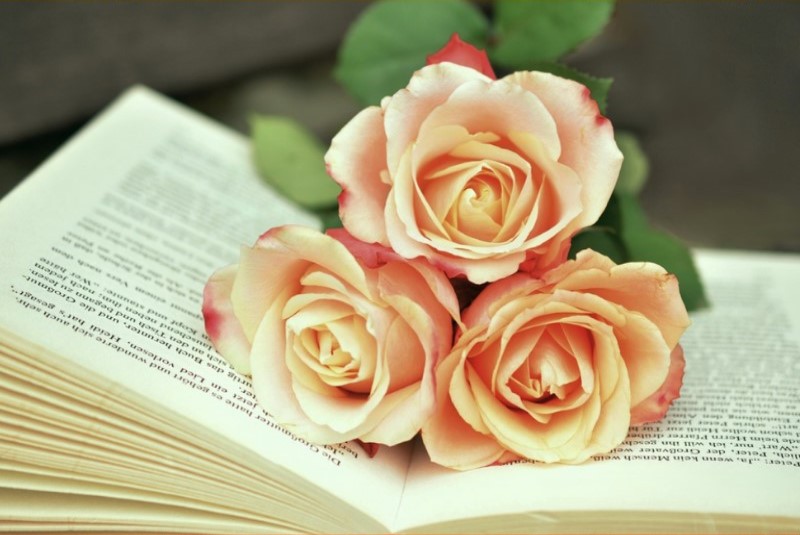
You can read their reviews here: https://rosieamber.wordpress.com/?s=UCC&submit=Search
UCC English Student Receives First Prize in Atlantic Currents Awards
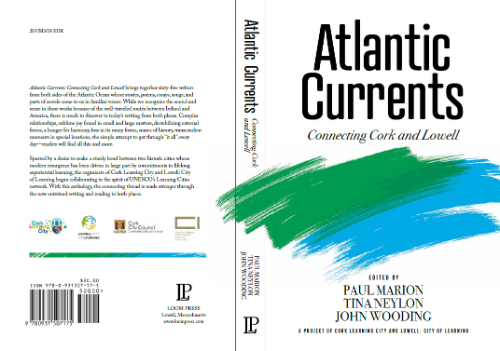
Congratulations to current UCC English third-year student Tadhg Carey, who was awarded first prize in the "Atlantic Currents II" awards. Tadhg's story "King", which will be published in the upcoming "Atlantic Currents II" anthology, is a political but more so a socioeconomic snapshot of a freshly post-Colonial Ireland. Blondy, the main protagonist, is growing up in an eight-bedroomed home in an affluent harbour village; one that had stood exclusively as a colonial gemstone for centuries. However, it has just tipped from the 1960’s into the 1970’s. Blondy is on the cusp of puberty and he knows no other socioeconomic existence other than that of his lower-upper class home, which is lavishly funded by his successful professional father. But the thing is, Blondy is Catholic, living in a home, in a village, that even just twenty years previously, his parents couldn’t have dreamt of aspiring to.
Well done, Tadhg, on a fantastic achievement!
Creative Writing Pieces Produced by Students in Gothic Literature Seminar
Students in Anne Mahler's popular Gothic Literature course have produced some wonderful pieces of creative fiction. As part of an exercise intended to explore how gothic fiction can be used to critique real-world events, the students wrote a series of stories about vampires that reflect broader social/cultural concerns.
Scroll down to read the tales.

"Vampire Story" by Laura Cambridge
Twenty-twenty, what a ‘bloody’ year. My name is Sean Vans, originally from Transylvania. However, I have found myself in Australia. Unlike, America it’s always warm and there is constant sunlight. You are wondering, why would a vampire willingly choose to live in a place where they celebrate Christmas on the Beach. I also ask myself that question every day. I guess, I wanted to move away and try some fresh Australian blood. So, here I am down under and I am well and truly stuck in this ‘bloody’ country.
It began at the beginning of the year with the raise in temperature and all that global warming stuff. I had never really cared about it or really witnessed the true effects it was having on the world. I figured my ancestors, family and all the vampires I knew had survived pretty much everything. Then, February 4th, I remember it so clearly, how it all began. The night it all came crashing down. It was just after sun set, I was groggy after sleeping all day, hiding from that cursed sun. All I know what happened next was a phantasmagoria of horror and misery. The aroma of burn permeated the air. Initially, I thought this was a personal attack against vampires. Maybe they wanted to burn us out? I knew we had been getting greedy but very little in the community had suspected it was vampires. I could hear the screams of thousands of animals hustling in the distance. I quietly transported myself to where it was all happening. All I could see was red. The forest was burning right before my eyes, I was ironically frozen in a place full of heat. I remember seeing koala bears stuck in the trees, falling to their deaths or being burnt alive. Kangaroo’s jumping and clashing into one another, in an attempt to escape the rapid wildfires. Five hundred and twenty-three years I have been around, and I have never seen something as horrifying as this. The wildfires spread and spread, the temperature got higher and higher and hundreds of thousands of animals did not make it. It wiped out ecosystems, habitants and left Australia with many endangered species. What made it worse is, it was only the beginning.
Pushing onto March, when I thought to myself surely nothing can top these wildfires, along came the Coronavirus. Bringing with it more, pain, destruction and death. It literally brought the world to a halt. Or so it tried to. I know what you are thinking, a vast amount of people dying, no one knows the case, the treatment or how to cure it. What a perfect deal, easy work for vampires. Yet, we had to find out the hard way. My old pal, Matthew, found himself a body, recently deceased in a secluded area. He was chuffed, easy blood. No work needed. Finding fresh dead bodies is always a bonus. Or so we thought. Turns out, the body was infected with Covid-19. The deadly virus now was in Matthew’s blood. He died himself, within days. It shook the Vampire community. Vampires are supposed to be immortal. Vampire families that had been around since the Iron Age were wiped out. Now we are twice as careful. Many began going to slaughterhouses to access the blood and meat to provide for their loved ones. However, its not the same, it does not taste as good as the hot oozing blood from a human. Let alone the lack of nutrients. I would love to say its all okay now and everything has returned to normal, but it has not. I cannot even remember the taste of fresh human blood. It has been months. I do not know what is going to happen. Its outright ‘bloody’ madness.
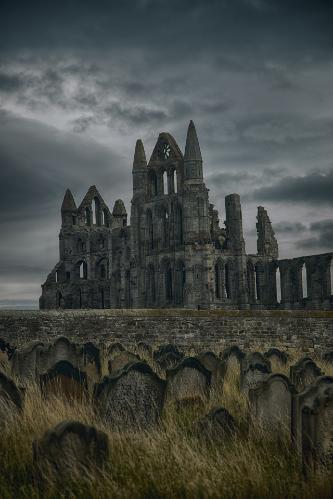
"A Meeting with a Lonely Vampire " by Sam Delaney
Perched atop the snow capped peak of a Transylvanian mountain
Was a solitary, eerie castle with a single, lonesome Count in.
And on a dark and wintry night sat alone in his empty castle
He sadly pondered upon the storm and wondered when it would last till
Yet at that very moment up a narrow and treacherous road,
Walked a young and fragile woman of barely twenty five years old.
Far out in the distance a looming structure she thought she spotted,
And with the thought of a nice, warm bed she was instantly besotted
Further up the path she trudged until finally she arrived
And with the smell of new, fresh meat, the Count’s mood was revived.
Upon the great oak doors she knocked, and to the great oak doors he flocked.
A night with a lonely, hungry vampire, I wonder will she survive.
Slowly the doors lurched open and she saw the looming figure.
Her eyes grew scared and wide and her apprehension grew even bigger.
Contemplating fleeing she looked back out into the mist,
But with a sinister drawl he said, “Come in, I do insist.”
But the vampire wasn’t hungry, and he didn’t want her blood
Perhaps he gave the wrong impression as the doors slammed with a thud.
But he was simply nervous, and he didn’t know how to act.
So long since he’d seen a person, he’d lost all his social tact.
“Welcome to my humble home, please stay for as long as you like.
However I must warn you not to traverse these halls at night”
At these words she ran to doors and fled into the night.
The vampire sighed and asked himself, “Is there no end to this plight?”
It is a dark, confusing castle, he only feared she would get lost,
And for his act of kindness, his own happiness was the cost.
For all the vampire really wanted was a real and gentle friend,
So as he roams his empty castle he no longer has to pretend.
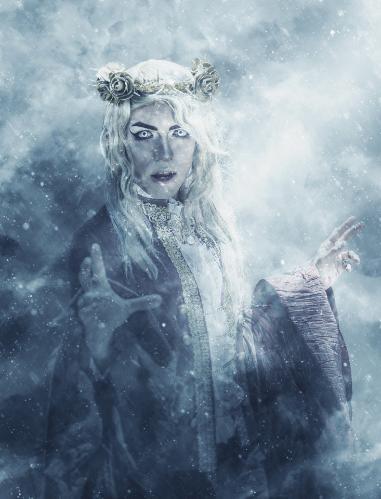
"Valentina" by Emily Dollery
If John was anything, then he was a romantic. He knew that he was staunchly average, and this didn’t bother him—after all, he had a comfortable job in I.T., he was reasonably healthy, and he was set to be wed in October. At home, he was regarded as a good man, albeit a boring one. John and Sarah had begun dating seven years prior. At social events, he would always talk about the first time he set eyes upon her. It was his first taste of college life, his first real party. He was never particularly disliked in school, but he erred on the side of solitude. John preferred it, he felt most people were tedious, and far too convinced of their own importance anyway. He was thinking about all of this, picking at the label on his cheap can, when he spotted Sarah. She was a gazelle of a girl—slim, mousey, and quietly graceful. Beautiful, but unaware of it. His own Madonna. From that moment, he knew that he had to have her. He followed her around campus, posing hopeful questions whenever she would humour him and offering her little tokens for a date, please, just one date.
Sarah was like home. Sarah was a kind, weary woman. She loved John enough to look after him, and feared him enough to do as he said. She knew not to complain—after all, she was very lucky. John always doted on her any time he gave her a new bruise. He told her that he loved her and that he felt like a monster before paying his penance in date nights and expensive gifts. Sarah loved him too, she really did, but she had begun to notice that John was distancing himself from her as their wedding date drew ever closer. He shrugged off her concerns, buried himself in his work, and lived on his phone. Some nights, while Sarah was pretending to sleep, she heard him leaving without explanation, but she knew better than to bring this up. This was usually followed by two melatonin pills, which would cause her to fall into an unhappy sleep. As John was out seeing Valentina, Sarah dreamt of blood and freedom.
Valentina was tall, voluptuous, and vaguely Slavic. John had messaged her first, having found her in a Facebook group for Siouxsie And The Banshees fans. To say he was enraptured by her dark, sultry style and milky white skin would have been an understatement. In the beginning, John only knew Valentina for her moody selfies and the sardonic wit that shined through her posts, but to him, she was everything. He needed her like he needed air, and something new ran through his veins. How he missed the thrill of pursuit! A new woman was in his sights, a temptress to Sarah’s angel. John had formed a para-social relationship with Valentina. Whenever some new, awful event was in the news, he would eagerly await whatever new take she had on it. Be it a clever jibe at some politician, or an impassioned rant about the state of the world, it only worsened John’s affliction as he became sick with desire. Valentina ignored his flirtations initially, but, knowing that he was one of many, he was not discouraged. He followed her on every platform he could find, going so far as to send her money and gifts. John’s obsession ran so deep that he was willing to do anything for Valentina’s attention. This continued until one day, finally, his efforts proved successful, and she decided to engage him in conversation. Valentina retained all of her charm in conversation, yet she was also flattering, making John feel like he was more than just some computer programmer. She spoke just enough to lure him in, yet not enough to prevent him from projecting all of his fantasies unto her. With Valentina, John felt strong, charismatic, and, for once in his life, special.
“You’re shorter than I thought you would be.” Valentina basked in John’s silence. A brief flash of contempt rose up in him, followed by a wave of neutered embarrassment. Something seemed uncanny about the woman who stood before him. Just as he started to recover from this moment of emasculation, Valentina burst into nasty laughter and assured him that she was joking. John flashed a self-deprecating grin, struggling to summon the same charms that had seemed to work so well on Valentina online. Once the initial awkwardness of their encounter had dissipated, the two slipped into a light conversation as they made their way to the hotel. Of course, John had booked a high-end suite for his first meeting (of many, he hoped) with the object of his desires. Before long, they were in their room. John shakily swished the large cask of aged red wine his date had brought into two glasses, as Valentina laughed a little too loudly and mocked the fussy upholstery of their surroundings. Her coal-black hair fell in tresses against her back, her red satin dress strained against her cinched waist, and John quietly bit his lip. He had begun to sweat in nervous anticipation, and he felt an itch at his neck—all of this only further worked to render him small and pathetic in Valentina’s presence. He asked her about goth music, figuring it would be a topic she would be enthusiastic about. She drained her glass with gusto as the pair’s conversation went from music, to politics, to their personal lives. By some tipsy slip of the tongue, John offended Valentina in some way, but he was unsure how. Frankly, he had had too much to drink to care, though he wondered why she seemed to be staring at him with such cold, focused ire. Her eyes seemed to linger on him for too long, and he swore he could have seen a glint of something pointed between her open lips. Not to matter; there was a beautiful woman in front of him, and for once, the alcohol was soothing him—not turning him into a monster. As John began to phase out of consciousness, he felt more peaceful than he had been in years. He was on his back now, gazing up at the stunning Valentina through half-open eyelids, so happily powerless. Noting the mural on the ceiling of the suite, and the gold chain necklace he had previously bought for Valentina now resting on her slender neck, John fell unconscious with one thought in his mind: This woman is going to drain the life out of me.
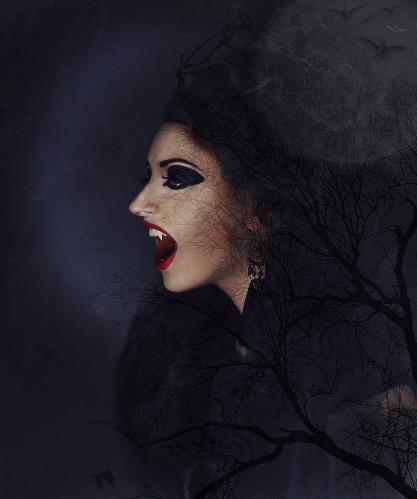
"A Devil Wrapped in Silk" by Ben Donnellan
There have been many sleepless nights
And many torturous days,
Time slipping by,
The hours so much the same.
We barely noticed the years pass.
Yet still I grow more absent,
The inmate and our prisons guard.
Wilting, dulling,
My own stranger on the edge of the branch.
There is a hum in our mind,
A constant hunger, a constant want,
To feel on our tongue
The power of life,
A living open wound.
This is a love that devours,
A love that immolates the self-staked heart,
Built of memory,
Of mortal man.
I learned what mortal meant.
That soft break in your breath,
Our communion,
Body, desire, necessity.
You held me and we cried,
Skin like frozen silk, eyes burning
Radiant as the dawn.
Memories of the past,
Of hunger.
Dearest friend, how cold I am,
No sun to warm my flesh,
Yet our blood runs warm and red.
"Vote Vampire" by Niamh Duffy
Mr Omar Kutznov is the perfect politician. Nay, Mr Omar Kutznov is the perfect man. How he came to be a politician was merely a matter of having connections, possessing an IQ almost higher than his age, and, as is the case with most politicians, he mystifies the populace of his constituency with dignified jargon. Queerly, he is also the antithesis of a modern politician- no one would dare chuck a milkshake at this authoritarian. He is not one to be laughed at. He is far too dignified and measured to attract such buffoonery. If anything, there is one last piece of background information which is vital in understanding Mr Kutznov. That is, the innate sense of mystery that surrounds him has always been a source of interest to whomever he should come into contact with. It is charm that is intrinsic to Kutznov’s nature. A charm that he oftentimes manipulates to his advantage.
The perfect man gathers his cue cards in his hand- not that he needs them. He fakes a deep breath in, shifting his shoulders upwards and letting out a notable breath from his nose.
‘Nervous?’ asks his colleague.
- It worked. It always works.
‘These things never seem to get any easier.’
But it was easy. It was laughably easy. Giving a talk to university students about drug abstention was easy. Why did he take to the stage so effortlessly? I believe the Bard put it best. It portrays the perfect man’s philosophy better than I ever could. ‘All the world's a stage, and all the men and women merely players: they have their exits and their entrances; and one man in his time plays many parts, his acts being seven ages’.
‘C’mon Omar, you know as well as anyone you are cool as a cucumber up there. The rest of us wonder how you keep so, what’s the word… zen! You know, in a few years you could be in the running to lead the party. You’re the only Tory in years to get the media feedback that you have. You’ve got to admit, they bloody love you. Heck! Even my wife fancies the pants off you.’
‘You flatter me too much, I assure you’, he answers with the perfect amount of polite laughter- not overweening, not manic, not fake. Just right. Good. ‘As does your wife, I dare say’.
The colleague looks downward and gives a hearty chuckle.
‘Yeah. Look, Omar, you’re on in two, I’ll be in the crowd. Best of luck.’
The UCL president concludes his introduction and quaintly gestures and nods his head offstage and proclaims, ‘Introducing, Minister for Education, Minister Kutznov!’
Kutznov’s speech was well-received. He handled the various rebuttals and onslaughts of scathing criticisms from the university students with the utmost grace and dignity. His low and grainy voice mélanged with an elocution that the Queen of England herself aspires to was enough to make even the wokest, whiniest snowflakes acquiesce. Nine times out of ten they surrender and accept his matchless intellect. It may be prudent to mention that Kutznov disdains woke culture. He scoffs at their lack of brain power, their social vulnerability, their tendency for mental health issues, their bellyfuls of insecurity, their incessant need for protection, and their unquenchable desire to outpour their deepest and darkest emotions- the youth of 2021 are naked. Stripped bare of mystery and left for the vultures of humanity to pick, and tear, and gobble up their innermost beings. It is enough to make one wonder why he had attended every single youth conference that year, and why he is consistently the first to volunteer for talks in schools and universities, and why, in God’s name, he was elected Minister for Education.
A little later he attends the local pub, as is usual after a particularly successful speech. The two enter a dimly lit tavern which would not look too out of place in Chaucerian times. The only source of light was that emanating from the gaggle of young girls in the corner, university students who had attended the talk. Five of them. One of them covers her mouth with a hand gloved by the end of her long, knitted, cream cardigan. She lowers her head as she holds in a silent fit of giggles, thus exposing the whitish-blonde roots of her predominantly lilac hair. Her manner and appearance appealed to Kutznov, not to mention the smell of her perfume, like a mossy wood. Clinique, it was. Very pungent. He rather liked it.
‘I’m just off to the loo’, he hears her say from the other side of the bar. Good.
As she enters the tight cubicle, she turns to slide the lock on the door. Only to turn around and see the perfect man standing there. He stares at her with eyes that pierce the very air between them and penetrate her stomach with stabs of anxiety. The girl lets out a squeal like a slaughtered pig and immediately turns to let herself out, but the lock was gone. Before she knows it, the man moves eminently closer to her body, which in his eyes is a mere sack of skin, and bone, and blood. He slowly places his forehead against hers, rendering the victim speechless, and stagnant in time. He slowly licks the sweat which is now oozing rapidly from every pore in her face. He tastes the flavour of human fear. The insatiable flavour piques the lust for the hot blood that insulates the helpless creature entrapped within his control. Without further hesitation, his eyes blaze red and he violently bears his needled teeth into the neck of the young, nameless victim- now reduced to a gory pile of flesh to nourish the lust of an animal. The girl violently shakes as if g-force had a hand in it, and monstrously foams at the mouth, almost taking away from the overcoat of saliva which sheathes her chin and endlessly drips onto the floor. Her eyes turn from a forest green to a bloodshot crimson. Finally, once all the blood is drained from the carcass, the vampire lets it drop to the floor like a sack of flour. He proceeds to use a delicate piece of toilet roll to wipe the excess blood from his mouth, then strides out of the bathroom.
Just as he is about to saunter out of the pub, a young woman’s voice can be heard from behind, accompanied by a faint tap on the back.
‘Excuse me, Mr Kutznov, would you mind taking a quick picture with us before you go?’
‘I do apologise, I am running rather late for a prior engagement. Have a good night’.
‘It’s for our friend, Mia, she has just gone to the toilet but she brought us to your talk today, she’s a big fan of your-…’
‘Goodnight, ladies’
And with that, the perfect man disappears into the busy streets of London after what could be considered a productive day at work.

"Isolated Cravings" by Shannagh Whelan
The dark had fallen quickly and, looking out of her thin paned window at the city silhouette outside it, she knew the hour had come. Bells chimed 11pm on a winter’s night as she hastened her way out of her flat and onto the city streets below.
Her apartment block was old, and cold, and dodgy at the best of times, and recent events certainly hadn’t improved matters. If she were anyone else, she thinks she would fear for her safety a bit as she skittered down the iron stairwell, down and further down until eventually, her feet hit the concrete of the city’s soil. But the residents knew her, or at least could read an aura well enough to stay away, which she thinks works out best for both parties involved.
She pushes the door to the building open, and once the cool air hits her and she’s out in the open, she feels like she can finally breathe. With that, though, comes the thirst, creeping up on her and slowly seeking sway of her senses. It’s instinctual, for the most part, and it’s taken her a while to come to grips with it and learn to control it, instead of letting it control her. But she has. She shudders now to think back on the start: the messy, regretful existence she led, and the suffering that came at her scarlet-stained hands, but the past can stay buried now. She tries her best to live within her means these days.
The empty streets echo with a loneliness now, a sound that only the night’s creatures would recognise when they heard it. The pandemic had wiped out all the usual sounds of life, and left a silent ghost town in the aftermath. The hollow sound of rain drops on pavement, the absence of clicking heels on the cobblestone, the faraway chatter of others from the safety of their homes… loneliness. She knew it well. And to her, it meant hunger.
These days, the routine in her feeding has been derailed. The past few months have been like starting anew for her, with challenge after challenge cropping up to throw her off. Day time has always been a write off, but now night time no longer provides the same opportunities it did, and she’s struggling. It’s hard, finding somewhere to satisfy her cravings in a world locked behind their doors, in a world with bubbles and curfews and precautions.
Indoors, all the time. The night time drinking culture that used to fuel her feedings, eradicated. She looks up at the ghosts of the derelict pubs as she strolls by them, the once-teeming night clubs and other social haunts that have become a thing of the past in the months gone by. It was so easy back then, it feels like she almost took it for granted.
To be a young woman, wandering the streets alone at night on a regular basis… the men used to do it to themselves. The decent souls would leave her alone, as they should, but the creeps were persistent, and blissfully unaware that the fear they were sure they were instilling in her poor little feminine heart should have been the other way around. It wasn’t hard to find one who would follow, and leading them gladly down a dark, sheltered alleyway was a means to a miserable end, just not in the way they were expecting. She used to think it was justified, in those cases. The leering look she’d find smeared across the faces of those men solidified it in her cold heart, as she watched them walk closer and closer, until they reached a comfortable distance in which she could snap their neck, and drain their blood at her leisure.
There were still a few fools wandering the streets off their heads at night now, but her usual prey had mysteriously vanished along with the crowds of vulnerable women usually swarming after a night out in town. They didn’t think it worth their while now, she supposed, but that had left her with a dilemma. Contrary to popular belief, she did like to think she had a conscience, and even such a thing as vampirism had a moral code in her mind.
So she looked around the streets, and weighed up her options. She chewed her cheek as she thought, and the metallic taste of blood filled her mouth as a result, which didn’t help matters. As she passed one alleyway in particular, she saw a group of regulars she knew well, who would gather there for warmth. That was one thing she had always clarified with herself. Those who slept on the streets with no other choice would never be her prey. To her, they were both outcasts from a society who didn’t care about them, who would rather believe they didn’t exist than confront the reality that they do. She gave a nod as she passed by, and received a single wave back. They knew of her, and were respectably wary, but they had a mutual understanding between them. They never told authorities their suspicions when mysterious bodies turned up on the streets, and she did all she could to keep them safe from her and others of her kind. They knew the rituals; she’d taught them all she could. They co-existed peacefully, with a healthy respect for the power each held over the other. As all good alliances should be.
Before she could finish her contemplations, a pang of hunger hit her hard. She stopped under a streetlight, and clutched her pounding head as she wracked her brain. She could feel the dark cloud looming at the edges. It would take over if she didn’t act soon.
The only option left was a cliché. She didn’t mind though; it was this or starvation. If she didn’t kill in the next hour, she would lose control, and all of the carefully built bridges in her life could crumble in one night of savagery. So she dug in her coat pocket, and brought out a small glass vial of liquid, and a crumpled sheet of paper. This was another part of the aforementioned allyship. The name and address was clear and concise, and she knew it well from her walks around town. An evil soul, they had said, and she trusted their judgement.
She lifted the vial of liquid up to the background of a cloudless, star speckled sky, and allowed a few drops to fall into each eye. She then mussed up her hair, bit her lip – more blood, more hunger – and then ripped her tights for good measure. Then she continued her walk, but with a limp this time, until she approached the rather stately house in question.
As she stumbled up the outer steps, she took a deep breath and readied herself for what she had to do. Then, three sharp knocks, and she waited. After a few seconds had ticked by, she heard a shuffling, and the door was opened by a man with furrowed brows and a mouth set in a hard line, which transformed with puzzlement as he took in the sight before him.
“Please...” she murmured, letting the word catch on its way past her lips, “please, sir, I know it’s late, but I don’t have anywhere else to go.”
She watched as understanding - and opportunity, she thinks - flickered into the man’s cold eyes. She knew too well the mistake that was soon to come.
“Of course, darling, come in.”
BA in English Student Writes Children's Book
Anna O’Connor, a 19-year-old student in the Department of English's BA programme has written a children’s book explaining how Santa Claus will still visit this year despite Covid-19 restrictions.
The book is available on Etsy and on Amazon for Kindle readers.
Read about Anna's work here: https://www.corkbeo.ie/news/local-news/cork-students-book-explains-years-19293900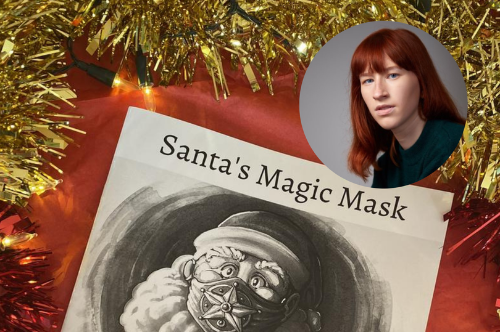
Break It Down: English Students Launch New Podcasts

Holly and Hilary are students in the English Department who were introduced to podcasting as part of a second-year science fiction module taught by Dr Ciarán Kavanagh. Since then, they have launched their own podcast called "Break It Down!", which focuses on " the unexplored areas of popular culture". Each week the hosts explore an interesting facet of recent pop culture, from Ringo Starr to Irish boybands of the Celtic Tiger era.
You can listen to episodes of "Break It Down!" here: https://breakitdownpodcast.buzzsprout.com/
And you can follow the podcast on Twitter: https://twitter.com/breakitdown_pod and Instagram https://www.instagram.com/breakitdown.podcast/
Third-Year Students Produce Science Fiction Podcasts

Students in Miranda Corcoran's seminar "Watching the Skies: Twentieth-Century American Science Fiction" have produced a series of podcasts exploring the relationship between science fiction and popular culture.
Episodes cover everything from the representation of women in science fiction and the popularity of YA dystopian fiction to monstrosity in SF and the history of The Twilight Zone.
You can listen to the episodes here:
Visiting scholar
The Department of English was delighted to host Dr. Imke Lichterfeld (University of Bonn, Germany) on an Erasmus+ Teaching Mobility exchange in March 2020.
Students of the MA Texts and Contexts: Medieval to Renaissance programme participated in a masterclass on Thomas Middleton’s gory drama The Revenger’s Tragedy (c.1607), led by Dr Lichterfeld. This MA group, with Dr Lichterfeld and our own Dr Edel Semple, also toured Cork’s historic Elizabeth Fort and learned about the city’s and Fort’s development from the early modern era to the modern day. As part of the Department of English Research Seminar Series, Dr Lichterfeld delivered a research-in-progress paper entitled “Inclusion on Stage? Shakespearean productions and racism, sexism, and ableism.” The paper was followed by a Q&A and a lively discussion with the audience of undergraduates, postgraduates, and staff from the College of Arts.
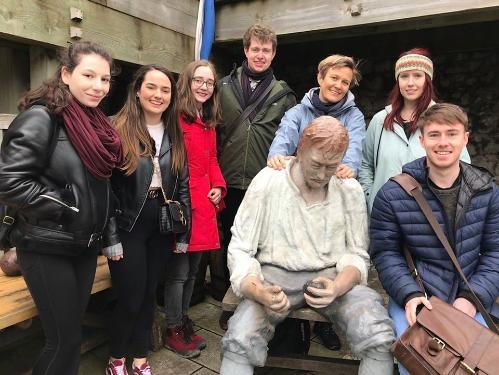
Shakespeare on Screen
Students in the Third Year seminar “Shakespeare on Screen” have been busy with creative and critical work. The class recently designed and pitched adaptations of Shakespeare’s comedy Much Ado About Nothing. In groups, students proposed adaptations that centred on key scenes, and each proposal included details on the film’s casting, target audience, genre or style, setting, and camerawork. The proposed adaptations included a film set in the upper class milieu of eighteenth century London, a teen rom-com set in a modern university, a film made in the style of TV’s Love Island, and a film set on a Mediterranean island drawing inspiration from popular movies such as Mamma Mia! As part of their coursework, the “Shakespeare on Screen” class also visited the UCC Skills Centre. Here, students participated in a session on unpacking the question and began work on their end-of-term papers on Shakespeare on film.
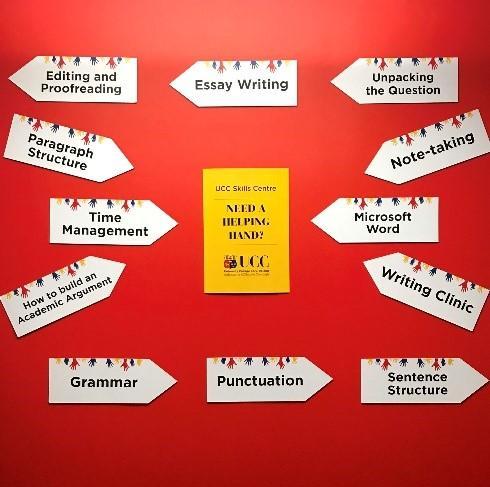
First-year students produce magazine
First Year students on the BA in English module “Problems in Literature” have produced prototype magazines promoting and examining the short story as a genre. In this module, students conduct independent research and work in groups to explore the history, reception, and future of the short story. Over one semester, the groups create a unique magazine with a theme central to the short story form, critical and creative elements, and an appealing cover. With strong ties to the Cork International Short Story Festival, the module is coordinated by Edel Semple, taught by expert staff in the Department of English and in the Boole Library, and each year enjoys guest lectures from visiting writers.
Well done to our first-year students for creating such beautiful and unique magazines!
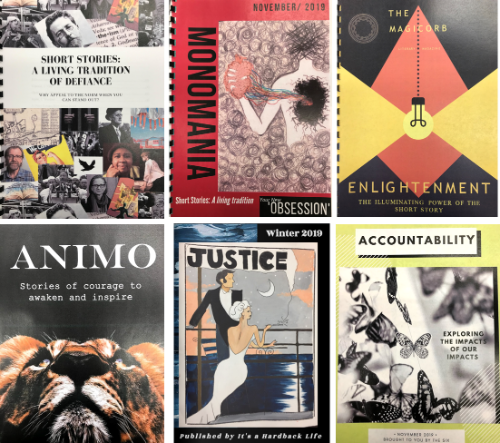
Second-Year Students Produce Podcasts on Witchcraft in Popular Culture
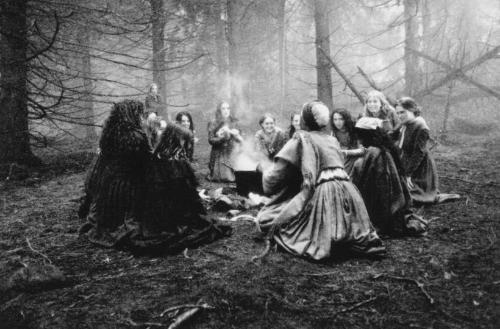
Second-year students in Miranda Corcoran's undergraduate seminar "Witchcraft in the American Popular Imagination" have created a series of exciting podcasts exploring the representation of witchcraft in history and culture. Looking at everything from the plays of William Shakespeare to Mary Poppins, each episode discusses the history, folklore and politics of witchcraft.
Episodes can be streamed online here: https://popwitchcraft.wordpress.com/
English Department
Roinn an Bhéarla
Contact us
O'Rahilly Building, University College Cork, Cork. Ireland
